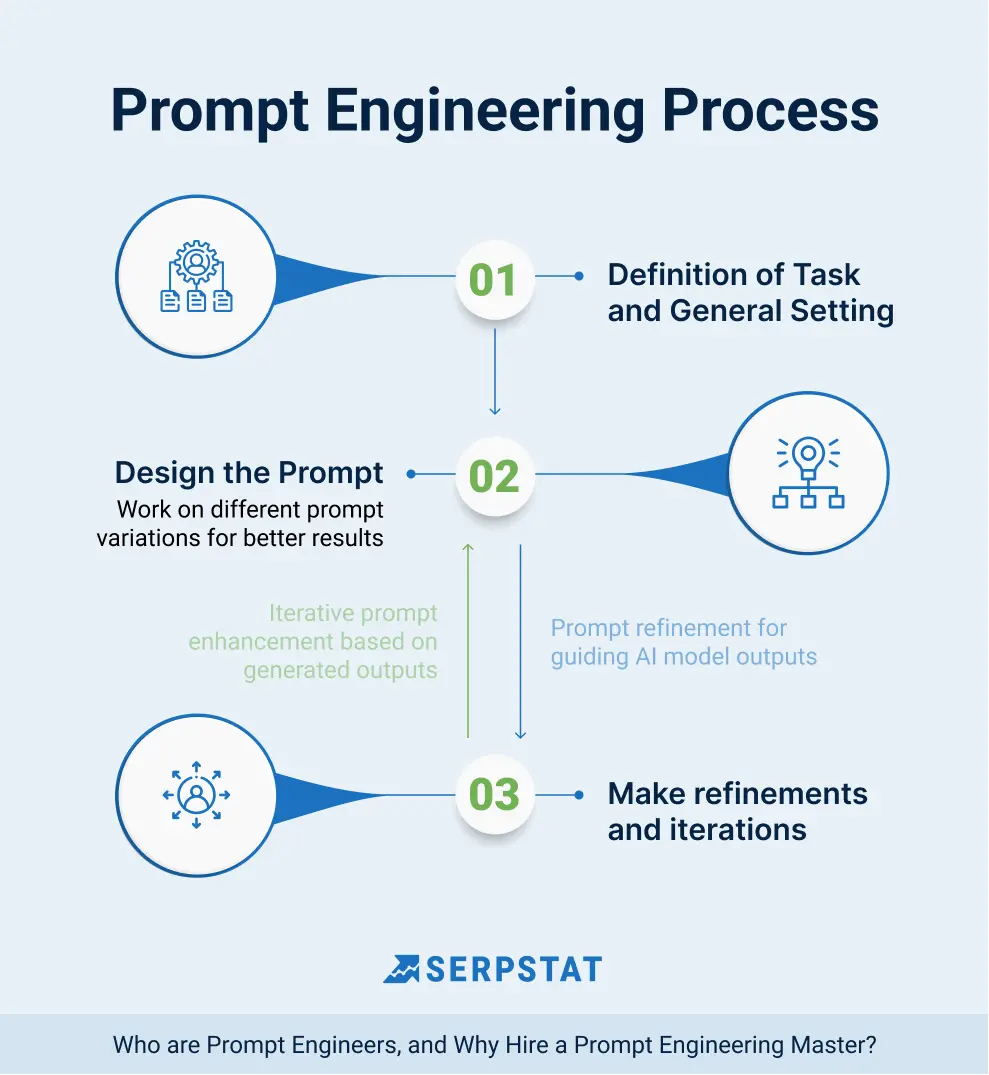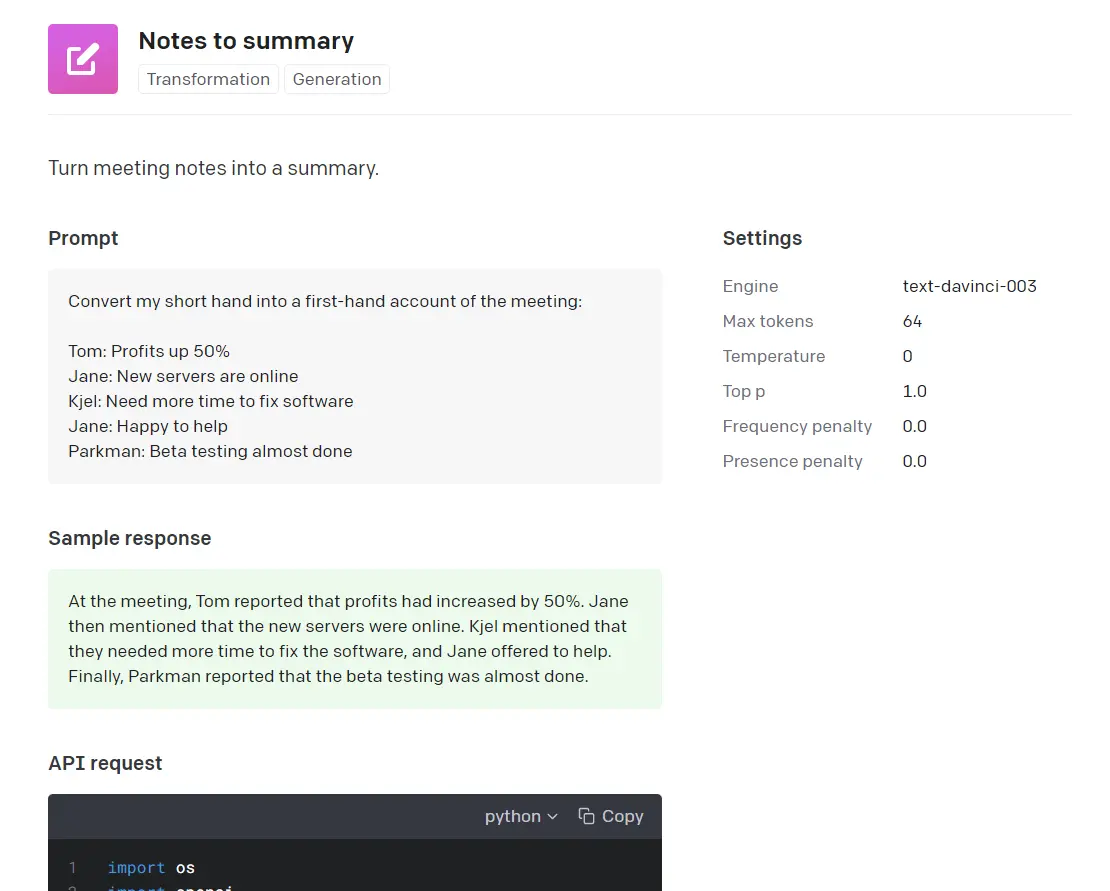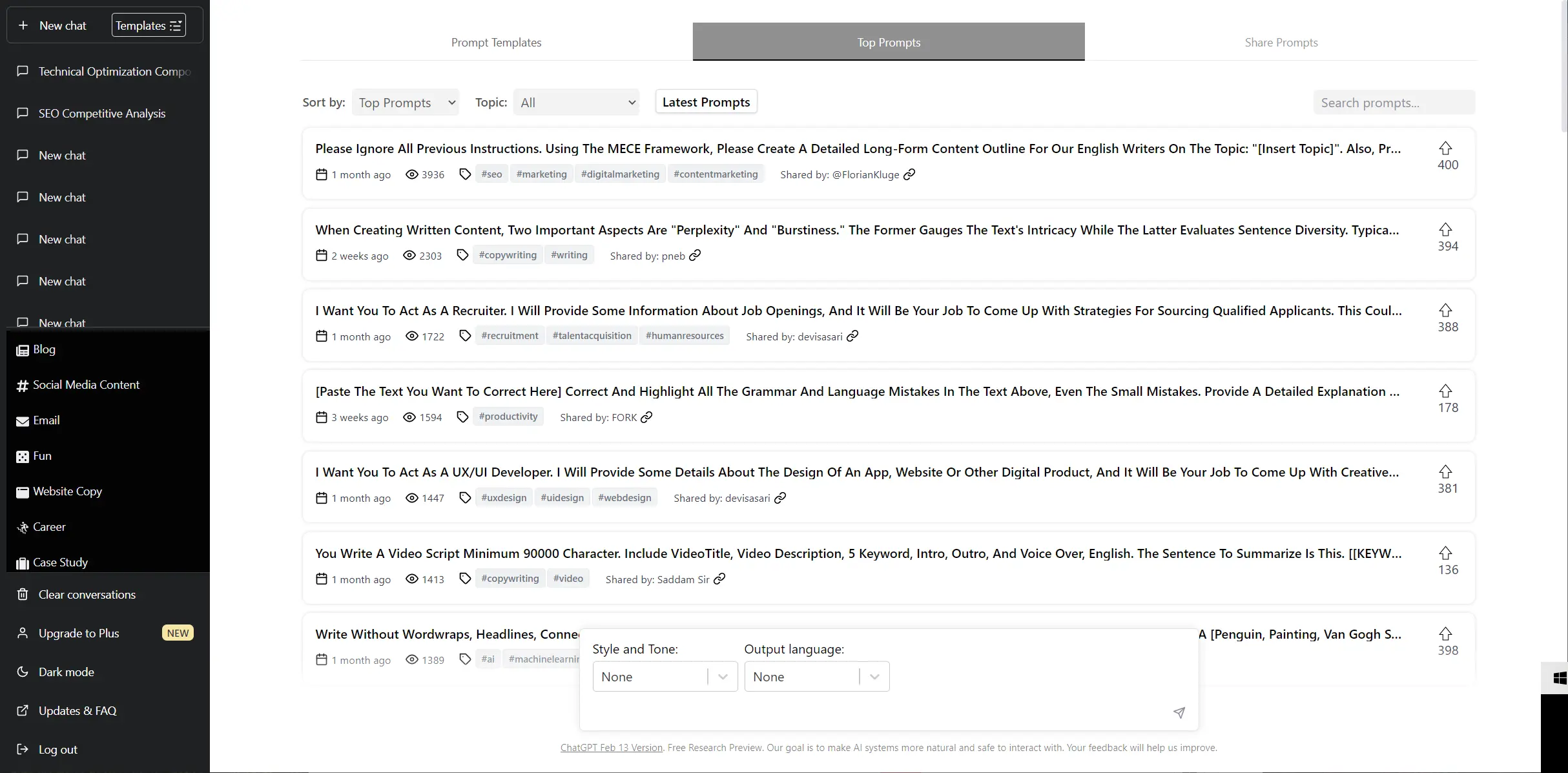Start Exploring Keyword Ideas
Use Serpstat to find the best keywords for your website
Who are Prompt Engineers, and Why Hire a Prompt Engineering Master?


In the rapidly evolving world of artificial intelligence, a new category of professionals has surfaced — prompt engineers. These masterminds of AI manipulation hold the keys to unlocking the full potential of generative AI models. But who exactly are these prompt engineers, and why should you consider hiring one? Let's find it out.
What Is Prompt Engineering?
Prompt engineering is a fundamental concept in the field of artificial intelligence that focuses on designing and refining the input given to generative AI models. It is both a practice and an art that embeds the task description or desired outcome within the input, typically in a question-answering system or a directive.
Providing high-quality inputs is crucial in obtaining accurate and helpful responses. Vague prompts may result in inaccurate or unfavorable responses that adversely affect the user. Prompt masters deeply understand how to design and refine prompts, leveraging their expertise to achieve specific and desired outcomes. They aim to guide AI systems toward producing outputs by deliberately and systematically manipulating the prompts and underlying data structures.
Engineers typically work with various AI systems to develop and enhance multiple applications. These systems include:
- GPT-3.5. The powerful and cost-effective GPT-3.5-turbo is part of OpenAI's model lineup. It builds upon the capabilities of GPT-3 and excels at generating text or code, providing valuable assistance in diverse tasks.
- GPT-4. The advanced GPT-4 models developed by OpenAI possess exceptional reasoning capabilities and extensive general knowledge. These models excel at solving complex problems with high accuracy, making them invaluable for various applications.
- DALL·E. OpenAI's DALL·E is a unique AI system that generates lifelike artwork based on textual prompts. It can create images of specific sizes, modify existing ideas, and produce variations of user-provided images, offering a versatile tool for creative projects.
- Whisper. Whisper, an OpenAI model, specializes in general-purpose speech recognition. It excels in language identification, speech translation, and multilingual speech recognition, empowering engineers to build applications with powerful speech processing capabilities.
- Embeddings. Embeddings are numerical representations of linguistic units such as words and phrases. These representations capture semantic meaning and relationships between different linguistic elements, enabling engineers to develop applications that leverage the semantic understanding of the text.
- Moderation. OpenAI's moderation models are designed to assist in content moderation tasks. They employ machine learning techniques to identify and remove inappropriate or harmful content from online platforms, contributing to creating safer and more responsible online environments.
- Stable Diffusion. It is adept at generating detailed images from textual prompts. It also serves other purposes like inpainting and image-to-image translations guided by the text, offering engineers a powerful tool for image-related tasks.
- Midjourney. Midjourney, an AI-powered image generator, creates visually captivating images in response to textual prompts. Its outputs feature a distinctive artistic flair, allowing engineers to explore creative applications.
- Bard. Developed by Google and powered by LaMDA, it is an AI chatbot designed for text-to-text generation. Bard excels at engaging in conversations with humans, making it an effective tool for chatbot development.
- LLaMA (Large Language Model, Meta AI). It is a large language model which boasts an array of capabilities, including text generation, summarization, solving math theorems, etc. Its versatility makes it a valuable resource for engineers across multiple domains.
Prompt engineering cuts across different applications, including the development of chatbots that engage in natural language conversations with users, content generation (text or code), based on given prompts, language translation tools that facilitate seamless communication across different languages, and virtual assistants that provide personalized assistance and perform tasks based on user prompts.
10 Prompt Engineering Skills
Prompt engineering is a multidisciplinary field that requires various skills beyond technical abilities. While technical expertise is crucial, non-tech skills play a significant role in developing AI technology. Here's a closer look at five essential non-tech skills in prompt engineering:
In addition to the non-tech skills, prompt engineering also need a set of hard skills essential for the effective development and implementation of AI technology.
Technical skills are valuable but optional. One of the reasons why large language models have been adopted so quickly is because they open up an entirely new audience to interacting with computers where programming languages are not required.
However, I believe developers have an intuitive understanding of those interactions with computers and can more quickly create and iterate on high-quality prompts. Additionally, through scripts, prompts can be tested at high velocity to drive even deeper understanding and refined prompts to achieve the output required.
We are already seeing the rise of tools and methods to automate the generation of better prompts. And, like at Speak Ai, teams intelligently use our understanding of customers to automatically compile prompts and make the process of getting good responses as easy as possible. Both trends will continue, and some well-respected, knowledgeable people in the area already believe that prompt engineering will be a short-lived career.

Here are five hard skills that prompt specialists should possess:
I am the co-founder and CEO of a transcription and natural language processing software company, Speak Ai, which works with 50,000 researchers, marketers, and businesses worldwide.
Generally, we work with these teams to take their research data (often a combination of audio, video, and text data gathered from internal interviews, surveys, and public data) and build a repository they can mine for insights. These teams then return those insights to internal teams or clients.
Previously, researchers used manual coding and a combination of named entity recognition, sentiment analysis, and data visualization to do this work. Still, with the democratization of large language models, these teams are now interacting with their research data through prompting. This has been such an interesting behavioral shift that presents new challenges and opportunities. We are excited to work at the intersection of it and are learning rapidly alongside our users and customers.
Personally, I am using natural language processing and large language models to build out content and support for Speak Ai, and create content on my website. I also love to share insights and resources on my YouTube channel about these advancements and how they affect the world as both business owners and people.

Prompt masters use NLP to create models to understand and generate human-like text. They can use NLP to classify documents and analyze the sentiment in blocks of text or train a machine-learning model that represents words as vectors ( embedding).
To pursue a career in prompt engineering, it is highly recommended to have a Bachelor's degree in Computer Science or a closely related field. This educational background provides a solid foundation in the skills and knowledge required for the role.
Prompt designers can skillfully navigate the intricate landscape of developing AI models by combining diverse skills and expertise. Their adeptness empowers them to craft impactful prompts, enhance model performance, and spearhead breakthroughs in generative AI technology.
The Role of Prompt Engineers in Innovation and Technology Advancements
The impact of prompt engineering lies in its ability to bridge the gap between the intent of the user and the capabilities of AI models. By carefully designing prompts, they can ensure that AI systems better comprehend and fulfill the user's requirements, leading to more effective and tailored outputs.As we progress, in the forthcoming sections, we will shed light on the significant components of this occupation.
What Do Prompt Engineers Do?
Prompt engineering involves a range of techniques and strategies, including incorporating relevant context, providing explicit instructions, and leveraging external knowledge sources. These techniques can improve the model's understanding of the desired task.
Prompt specialists work closely with software developers. They are responsible for identifying and fixing flaws in AI systems and developing strategies to maximize their potential. Prompt crafting plays a pivotal role in delivering exceptional responses from language models. The effectiveness of a language model hinges upon meticulously crafted prompts that mitigate off-topic, inconsistent, or offensive outputs.
Furthermore, prompt engineering also encompasses the process of iterative refining and optimizing prompts based on feedback and evaluation. Researchers experiment with different variations of prompts, analyze the model's responses, and make adjustments to enhance performance or address specific limitations or biases.

The primary task of prompt engineers is to understand the different classifications of prompts, enabling them to structure requests with specific target responses in mind. By employing well-crafted prompts, specialists optimize the performance and accuracy of AI models in generating relevant and desirable outputs.
There are several major categories of prompts to work with:
Source: Philippe De Ridder



Source: Prompt is brainstormed using GPTChat

Source: https://datafit.ai/prompt/11752
Source: https://datafit.ai/prompt/8701

It is important to note that while AI models can provide valuable insights, it is advisable to cross-check their responses with other sources when uncertain, as models may not always be entirely correct.
Supercharge Your SEO Strategy with Serpstat AI Tools - Get Your Free 7-Day Trial Now!
Optimize your website's performance, analyze competitors, and discover valuable insights.
How to Start Your Career as a Prompt Engineer?
LinkedIn data shared with TIME reveals a remarkable surge in references to "generative AI" on the platform. These mentions have experienced an astounding 36-fold increase compared to the previous year. Job postings incorporating "GPT" rose by 51% between 2021 and 2022. These statistics highlight the growing prominence and demand for generative AI technologies in various industries.
According to TIME, in some job postings, both Anthropic and OpenAI, leading AI research companies, shed light on the lucrative earning prospects for prompt engineers. Anthropic advertised positions for prompt masters and librarians, offering a base salary range of $250,000 to $335,000.
Likewise, OpenAI is actively recruiting many engineers to enhance the dependability and efficiency of their machine learning platform, ChatGPT. The salaries for research and engineering positions in applied AI can go as high as $370,000.
In the AI marketplaces, organizations seek prompt engineers and offer attractive salaries to secure their expertise. Companies selling AI images or tools are particularly inclined to hire them for the ability to train prompts and generate desired outcomes. This trend is observable across various industries leveraging AI technology.
Prompt engineering is a sought-after career that can be pursued despite limited coding experience. While coding skills are beneficial, non-coders can still excel in this field. However, it is essential to know that the prompt engineering job market is competitive due to its accessibility. In the beginning, consider creating prompts for various large language models (LLMs) to enhance your opportunities. You also can apply for part-time project work on one of the prompt marketplaces.
If you deeply understand language models and machine learning, you can explore more technical roles beyond prompt engineering. Utilizing your expertise, you can engage in activities such as building, training, and developing AI models. Expanding your skill set will enable you to explore various career prospects.
How to Learn Prompt Engineering?
Becoming a skilled prompt engineer requires honing several vital abilities. It is crucial to prioritize the development of critical thinking and problem-solving skills, proficiency in data analysis and visualization, expertise in Python scripting and integration with NLP models. Mastering these skills establishes a strong foundation for crafting impactful prompts and harnessing the unlimited potential of natural language processing.
Whether you are working with ChatGPT, Midjourney, or any other AI tool, crafting descriptive prompts becomes essential, ensuring they consist of at least seven words. Including a subject and descriptor in your sentences gives the AI model the necessary context to comprehend your intended message and generate accurate outputs.
Numerous courses offer valuable resources to enhance your proficiency in writing prompts for AI tools. Practicing and experimenting is key to refining your skills and understanding impact.
One example of a course that can aid in mastering the art of writing high-quality prompts for AI tools is "GPT-101," offered on Udemy. This course delves into the workings of generative language models, explores prompt engineering strategies, and provides practical exercises to reinforce your learning. These resources can significantly accelerate your understanding and proficiency in leveraging AI tools effectively. There is a Midjourney course as well.
You can also choose one of the introductory Google courses:
- Machine learning and artificial intelligence from Google Cloud;
- Elements of AI from the University of Helsinki in Google Digital Garage;
- Introduction to Generative AI.
What are Some Examples of Prompt Engineering Tasks?
Mastering prompt engineering is a challenging feat. While simple requests can be handled with basic queries, tackling complex tasks and routines requires a deep understanding and proficiency in providing detailed instructions.
You can find a few basic prompt structure examples at https://platform.openai.com/examples
An example of transformation and generation prompt

Prompt Examples from Users of GPTChat

Let's explore a few more examples:
- Imagine you're developing a virtual assistant for a travel agency. Prompt engineers must craft well-defined dialogue templates to handle travel-related queries, such as booking flights or suggesting popular destinations. The virtual assistant can generate informative and reliable responses by providing precise instructions.
- E-commerce platforms that utilize AI-powered recommendation systems are hiring prompt masters to fine-tune the prompts that guide product suggestions. By carefully curating prompts, these engineers help improve the accuracy and relevance of recommended items, ultimately enhancing the customer shopping experience.
- Gaming companies are increasingly recruiting prompt engineers to enhance their virtual worlds' interactive and immersive experiences. These engineers develop prompts that enable AI or non-player characters (NPCs) to engage in dynamic and realistic conversations with players, enhancing gameplay.
- Content generation platforms and social media tools employ AI prompt specialists to optimize the quality control and relevance of automatically generated content. By training prompts that align with specific target audiences or desired content styles, these engineers contribute to more engaging and personalized content creation processes.
Prompt specialists must meticulously design the dialogue framework to generate appropriate responses. Clear instructions and avoiding ambiguity are essential to delivering a seamless and valuable user experience.
The Benefits Of Hiring Prompt Engineers For Your Team
Hiring AI prompt engineers for your company can offer numerous advantages and help you leverage the power of artificial intelligence. Here are some key benefits you can expect:
- Expertise in AI technologies. Prompt engineering experts possess extensive knowledge and expertise in the latest AI technologies, such as NLP and ML. Their deep understanding ensures that you receive informed guidance and solutions.
- Tailored solutions. Prompt engineers work closely with you to understand your unique goals and requirements. They design and develop customized AI systems to fit your needs, ensuring optimal performance and alignment with your business objectives.
- Efficient development process. This streamlines the implementation process, enabling you to benefit from AI sooner.
- High-quality and accurate systems. AI prompt architects employ various techniques, including data validation, model evaluation, and testing, to ensure the quality and accuracy of the AI system. This results in reliable outputs that align with your expectations.
- Integration with existing systems. Prompt engineers have experience integrating AI systems with your existing infrastructure. This facilitates seamless integration, allowing your AI solution to enhance your current workflows.
- Ongoing support and maintenance. Prompt specialists provide continuing support and care for your AI system, ensuring its continued performance and addressing any issues.
- Cost-effective solutions. Hiring prompt engineers offers cost-effective solutions. They work within your financial constraints while delivering value and maximizing the return on your investment.
- Experience across industries. Deploying AI systems across various sectors, cross-knowledge helps prompt masters to optimize your AI implementation and ensures relevance to your business.
- Improved outcomes. By leveraging the expertise of prompt engineers, you can improve operational efficiency, enhance decision-making processes, and drive innovation within your organization.
Interactions with large language models are generally charged by characters/tokens. When interacting with large data sets, ineffective prompts leading to repeated attempts can become cost prohibitive.
Through our work, we have identified a template and structure to produce high-quality outputs:
For example, a good prompt for one of our teams may be:
We are a qualitative research team doing a series of focus groups for our enterprise e-commerce client in X industry who wants to know what people think about their latest product offering Y. Please generate a SWOT analysis from the transcripts of these focus groups. Please provide verbatim quotes for each point in the SWOT analysis category in a manner that could be presented to our clients.

Suppose you want to harness the true power of AI. In that case, hiring a prompt engineering master is your secret weapon to unlock unprecedented possibilities and stay one step ahead in the AI revolution.
Discover More SEO Tools
Domain Analysis Tools
SEO Domain Analysis – gain insights into your website's strengths and weaknesses
URL Inspection Tool
Uncover hidden SEO opportunities with our powerful URL Inspection Tool
Keyword Rank Checker
Google Keyword Rankings Checker – gain valuable insights into your website's search engine rankings
Competitor Website Analytics
Complete analysis of competitors' websites for SEO and PPC
Recommended posts
Cases, life hacks, researches, and useful articles
Don’t you have time to follow the news? No worries! Our editor will choose articles that will definitely help you with your work. Join our cozy community :)
By clicking the button, you agree to our privacy policy.
 Tyler Bryden
Tyler Bryden

